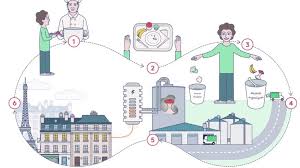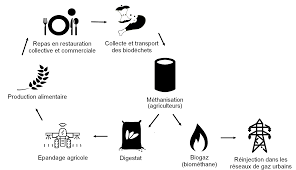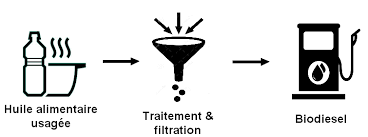Love Your Waste
Industrial and territorial ecology

![]() FRANCE
FRANCE
Location: Paris, France
Sector: End of life
Date of creation: 2015
Analysis by the association: March 2018
Maturity of the project: lasting
Collecting and recyling biowaste from collective catering.
overview
The company, created in 2016, assists restaurants, hospitals, schools and businesses in Île de France in the management of their food waste. It offers sorting at source and recovery of biowaste, before its recyling into biogas by methanisation² within 150 km of the collection site. It enablescompanies to comply with the Grenelle 2 law and the 2014 energy transition law.
Finally, Love your waste fights against food waste through communication and awareness campaigns among citizens.
Since 2010, the Grenelle 2 law introduced the principle of “polluters / payers” for biowaste: “people who produce or hold significant amounts of bio-waste are required to set up a sort at source and a valuation biological”. Today, this regulation concerns establishments producing more than 10 tonnes of waste per year, or the equivalent of 300 meals a day.
Failure to comply with these regulations exposes the head of establishment to a fine of € 75,000, a suspension of activity or even imprisonment.
The law on the energy transition of 2014 strengthens, for its part, the Grenelle 2 law with its waste management objectives near the collection and increase of the share of renewable energy in France to 23% in 2020 and 32% in 2030.
France
With 900,000 tons of biowaste produced each year in France, the catering sector (commercial and collective) is one of the largest emitters of biowaste from food.
Love your waste
- 120 clients,
- 260 collecting points,
- Collected waste each year :
- 630 tons of food waste (90% du total),
- 60 tons of oil (8%),
- 10 tons of coffee grounds(2%).
- Industrial and Territorial Ecology
project operation
Love your waste supports companies in the implementation of a tailor-made sorting (advice on the installation of sorting, providing appropriate signage and sorting training). It places containers at their disposal and then collects and transports their biowaste to the processing units. Collection and transport are carried out in collaboration with a local reintegration structure of long-term unemployed.


1 et 2 : repas dans la restauration collective et commerciale
3 : tri à la source
4 : collecte et transport des déchets par une entreprise de réinsertion vers les lieux de valorisation
5 : transformation des déchets en biogaz
6 : réinjection du biogaz dans les circuits électriques GrDF de la ville de Paris
Bio-waste is then recycled into biogas, biodiesel, agricultural amendment³ and fuel logs.
- Agricultural amendment and biogas
The valorization of biowaste in amendment and biogas (biomethane) is carried out by parisian area farmers through an anaerobic digestion process. The amendment is spread on agricultural land and biomethane is reinjected into GrDF gas networks.

- Combustible logs
The production of combustible logs is carried out by a partner company via a process of compression of coffee grounds and sawdust. The logs measure 20 cm and have a life of 5 hours.

- Biodiesel
Biodiesel production is done by an associated company that processes used food oils by filtration and treatment.

- Consulting
The company drafts and provides socio-environmental reports on the company’s CSR (Corporate Social Responsibility) processes, analyzes the production of bio-waste and makes recommendations to reduce food waste.
- Formation
In addition, Love your waste trains the team of collective catering in waste management and educates employees about sorting and food waste (innovative and educational workshops).
sustainable approach
- Reduced carbon footprint by replacing incineration and landfilling with anaerobic digestion. In fact, incineration generates fumes (6,000m3 per ton of waste burned), solid residues (300kg of solid residues of combustion and 40 to 80kg of flue gas cleaning residues) and liquid effluents4.
- Thanks to the sencitizing campains about the food waste, the catering companies could save about € 1.50 / meal according to a study by ADEME,
- Source of additional income for farmers via the resale of biogas produced by anaerobic digestion between € 64 and € 125 per megawatt hour (MWh) and savings on electricity purchases and amortization,
- Lower public waste treatment expenses. A study by ADEME shows that the treatment costs of a ton of incinerated waste amount to around € 80 (figure established in 2006) and estimates the price of the construction of an incineration plant household waste with a capacity of 10 tons / hour to 5 million euros in 2005,
- Source of income for Love your waste and all partner companies for the recovery of biowaste.
- Employment of 150 long-term unemployed through the partnership with a reintegration company,
- Local jobs not relocatable due to the collection and recovery of waste within a 150km perimeter around the collection site,
- Positive and educational awareness of citizens in sorting and food waste (awareness campaign, workshop organization …).
replicability & future perspectives
This project is easily replicable in other French cities because:
- restaurateurs and food companies must respect the new regulatory obligations and are turning more and more towards environmentally friendly practices, both with a view to respecting the environment. their own values and image conveyed to customers,
- the integration structures seek partners to support the long-term unemployed,
- farmers see a solution to diversify their business and benefit from an additional source of income. According to ADEME, 330 methanisers were in operation on 1 January 2017 in France, and this figure is expected to increase considerably. Ségolène Royal, former minister of ecology, launched in 2014 a call for projects for the installation of 1,500 methanisers in 3 years.
It is important to establish strong partnerships with partner companies and farmers. It is also essential to support companies in sorting their waste in order to provide partners with a good quality of biowaste to process.
- Biowaste¹ = solid biodegradable waste from households derived from animal or plant natural resources: food waste, green waste, paper and cardboard.
- Methanization² (or anaerobic fermentation) = process of transformation of organic matter into compost, methane and carbon dioxide by microorganisms (bacteria), in the absence of oxygen.
- Amendment³ = product brought to soils to increase their pH (lime, ammonium nitrate), their structure (sand, vermiculite) or their nutrients (compost, wood ash).
- Liquid effluent4= waste fluid of agricultural, industrial or urban origin, carrying a certain polluting load.
